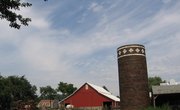Farms make ideal breeding grounds for ticks. With all the animals found on a farm, from cattle to dogs and humans to sheep, there is a plentiful supply of blood for ticks to feed on. Ticks can carry diseases such as Lyme’s disease, Rocky Mountain spotted fever. As ticks have few natural enemies, becoming their enemy is the farmer’s goal in dealing with them. There are practical steps you can take to manage tick populations using either chemical or organic methods.
Protect yourself. First and foremost you are going to want to avoid getting any ticks on your body. Treat your clothes using DEET and wear long-sleeved clothes.
Take precautions around your house. Treat your house pets with Frontline or another flea and tick repellent. Cut any lawns around the farm and apply tick granules to them. Keep guinea fowl or chickens in your yard or near the house. Guinea fowl and chickens are two of the tick’s natural predators.
Build nesting boxes and raptor perching poles for hawks and owls. These birds will form a natural balance to the number of small rodents and mammals in and around your farm. Therefore, the number of hosts for ticks will be reduced.
Vaccinate all cattle over 1 month of age. This is a first step in protecting cattle, especially dairy cattle, from ticks. Talk to a local veterinarian about the best vaccine to use.
Dip or spray your cattle with Bayticol or a similar product six times at three-week intervals, starting in spring. Combine these dips and sprays with pasture rotation. If the tick population decreases dramatically and remains low, you can decrease treatment.
Deal with deer. They can be carriers of ticks, and dealing with your own cattle is pointless if the local wildlife continues to spread ticks. Build bait stations for deer. These are basically food stalls where the deer puts their head inside to get to the food. By doing so, it rubs its head against a pesticide dispenser such as Permaguard or a citrus oil extract, which kills the ticks on the deer.
Writer Bio
Mark Wollacott began writing professionally in 2009. He has freelanced for "Kansai Time Out" and "Kansai Scene" magazines and he has also worked for Travelocity and the Austin Post, writing about travel, business and technology. Wollacott has a Bachelor of Arts in ancient history and archaeology from the University of Wales.



